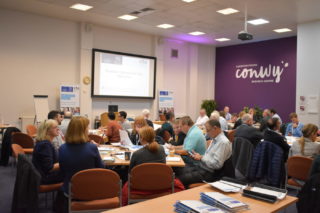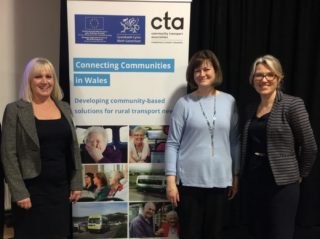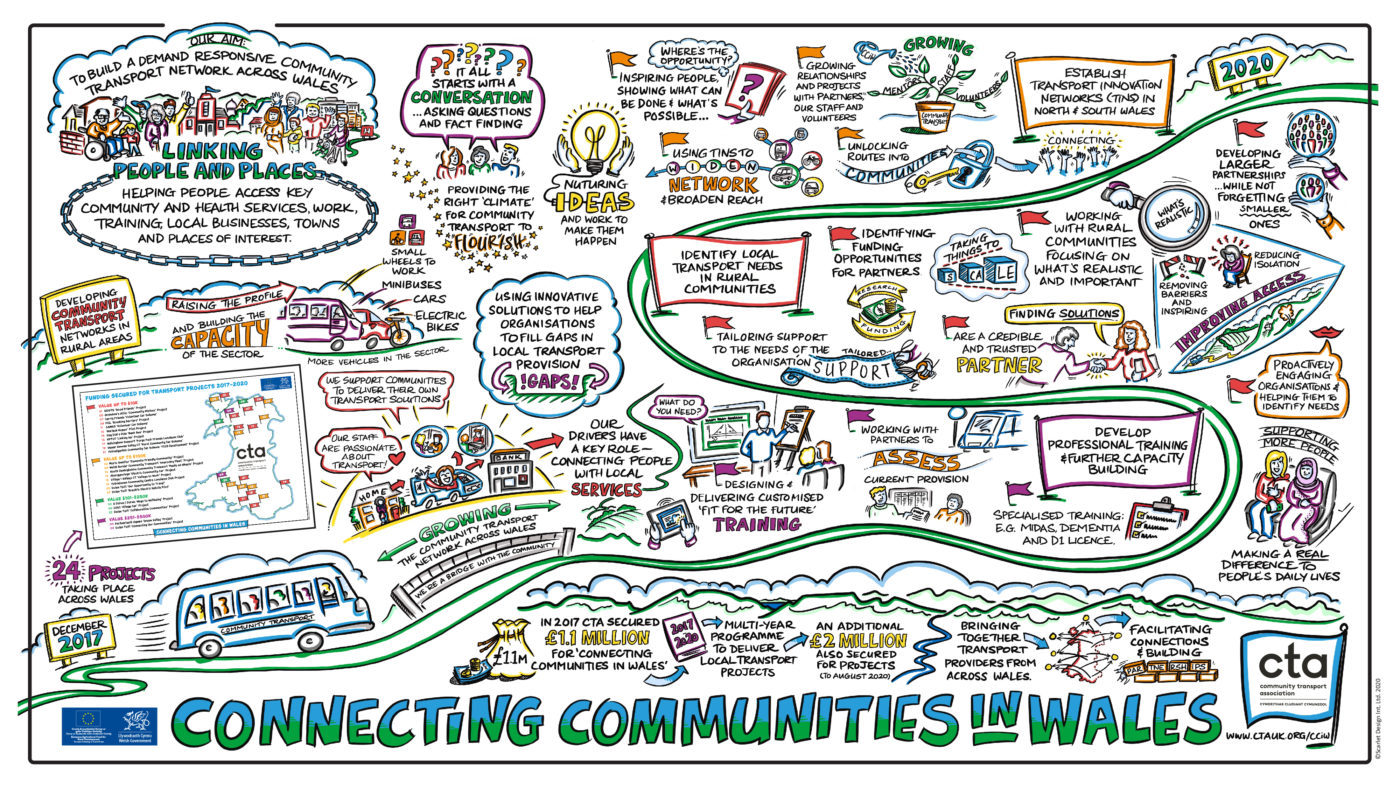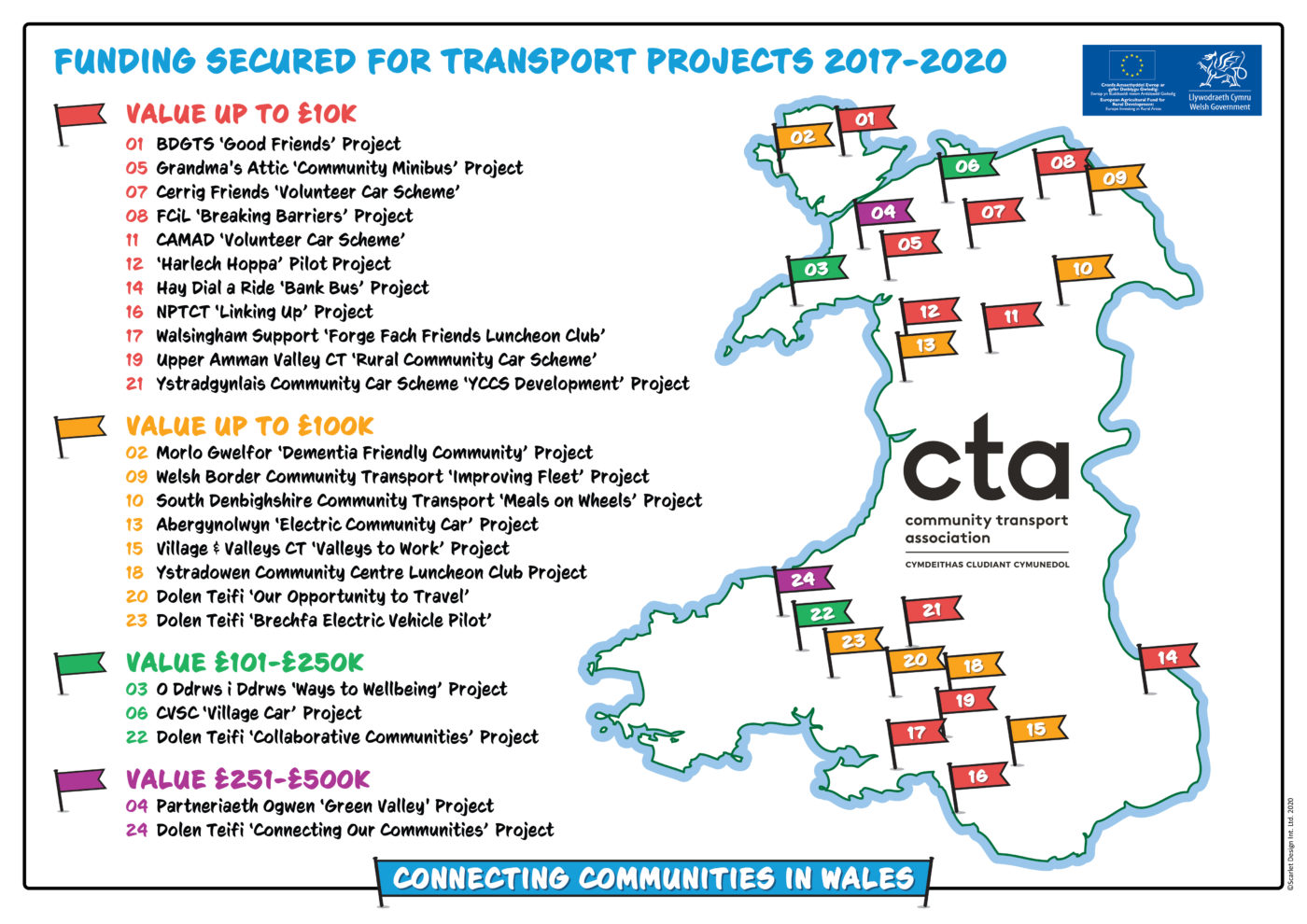-
Transport Innovation Networks
-
Darllenwch Yn Gymraeg
What are Transport Innovation Networks?
Transport Innovation Networks (TINs) have bee a key part of the first phase of the Connecting Communities in Wales. From 2017 – 2020, we brought regularly brought together community transport providers as well as representatives from the wider transport sector, third sector, private sector and Government to discuss connectivity and accessibility across Wales and opportunities for new initiatives. Conversations during the TINs to many of the projects and partnerships you can read about here, as well as promoting the incredible impact that community transport makes in so many communities across Wales.
What we’ve learned so far
Here you can find some of the highlights from previous Transport Innovation Networks.
Summer 2019

Our 2019 Transport Innovation Networks were hosted in Swansea, Conwy and Llandrindod Wells. As well as an opportunity to share the work that Connecting Communities in Wales had done up to that point, they were also forums to talk about the links between community transport and the environment as well as to promote the new training schemes that are available as part of the project.
Guest speakers included Rod Bowen from Dolen Teifi, who talked about how much support his organisation has got from Connecting Communities in Wales; as well as Delyth Higgins from Renew Wales who shared the goals of their organisations and their ideas about sustainability and community transport; and Mike Entwisle from Pembrokeshire Association of Voluntary Transportwho looked at the future of D1 training in Wales.
Below, you can find Rod’s presentation. Dolen Teifi are a community transport provider based in Ceredigion who have received support from Connecting Communities to access funding for their ‘Opportunity to Travel’ project as well as benefiting from training including MiDAS and D1 training, Governance training and Dementia Support training.
Autumn 2018

Our second round of Transport Innovation Networks took place in Llandudno Junction, Newtown and Swansea, and built on ideas generated at the start of the project. The events provided an update on the progress of Connecting Communities in Wales, a focus on how to put together a good funding bid and we were joined by Transport for Wales who shared their upcoming Transport Strategy.
One of the main highlights from this event was the discussion around the Transport Strategy for Wales, with Transport for Wales coming away with a much better idea of how community transport could fit in to their plans. It was encouraging to note that Transport for Wales took on board some of the discussions during the events, and updated their strategy to look at the importance of the community transport sector across Wales.
Guest speakers included Transport for Wales, Powys Association of Voluntary Organisations (PAVO) and Dunkling Conwy Voluntary Services Council.
Below you can find two presentations shared at the event: a look at what makes a great funding bid from PAVO, as well as the update from Transport for Wales.
Spring 2018

Our first series of Transport Innovation Network events took place in Spring 2018 across Wrexham, Caernarfon, Narbeth, Pontypridd and Abergavenny to make sure that the widest range of organisations from across Wales could attend.
At each event we went through the aims of the project, getting people’s thoughts and ideas about how they could get involved, and how the project could best support them. We also discussed research looking at the provision of community transport across Wales, as well as identifying the areas of support the sector needed and potential solutions the project could build on.
So many of the discussions at these events shaped the aims and direction of the project in phase one.
Find out more about Connecting Communities in Wales:

Connecting Communities in Wales has received funding through the Welsh Government Rural Communities Rural Development Programme 2014-2020, which is funded by the European Agricultural Fund for Rural Development and the Welsh Government.
-
What is Connecting Communities in Wales
Find out more about the project including our latest news and how to get in touch with the team. -
Projects and Partnerships
Find out about how Connecting Communities in Wales is setting up new projects and partnerships all over Wales. -
Training
Details of the training programmes available through Connecting Communities in Wales and how you can get involved. -
Resources
Download resources put together by the Connecting Communities team during the course of the project. -
Transport Innovation Networks
Find out more about our Transport Innovation Networks and what we've learned talking to community transport providers and stakeholders across Wales.









